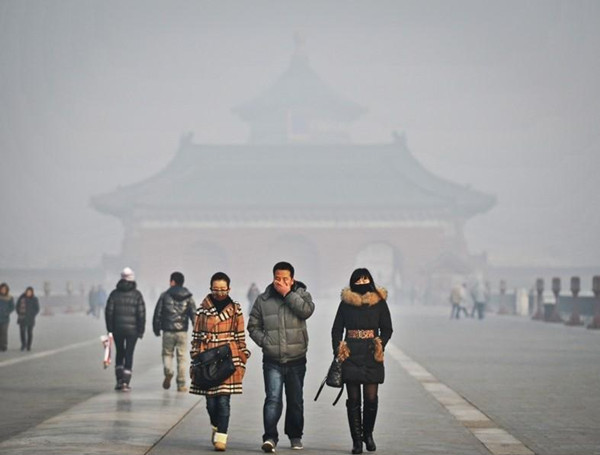State Council stresses PM2.5 control
 0 Comment(s)
0 Comment(s) Print
Print E-mail Xinhua, February 13, 2014
E-mail Xinhua, February 13, 2014
The State Council, or China's cabinet, has urged reduction of PM2.5 and other pollutants in smoggy cities as the key task in the fight against air pollution.
|
|
|
Residents walk amidst dense smog in Beijing on Jan. 12, 2013. [File photo] |
"Major cities and regions where smog is frequent should be the focus (of air pollution control), and control of PM2.5 and PM10 should be a key task," said a statement released after an executive meeting of the State Council held on Wednesday and presided over by Premier Li Keqiang.
The cabinet stressed that air pollution is the result of long-term accumulation and persistent efforts are needed to address the issue in order to accelerate the overall environmental drive and improve people's livelihoods.
In the latest monthly monitoring results for 74 Chinese cities, the density of key air pollutants PM2.5 and PM10 shot up by 55.7 percent and 30.1 percent respectively in December. These cities had on average of more than 70 percent of days failing to meet air quality standards, according to the Ministry of Environmental Protection.
The statement noted that overall consumption of coal should be controlled, calling for more efforts to promote high quality gasoline for vehicles, energy saving in construction and the use of environmentally friendly boilers.
It also stressed the role of taxation and government subsidies, revealing that 10 billion yuan (1.64 billion U.S. dollars) has been allocated this year as rewards for key cities and regions who make significant progress in air pollution control.
Various policies and industrial standards should also be improved to encourage the use of new energy cars and force companies producing high waste and environmental risks to reduce emissions.
During Wednesday's meeting, a draft revision to the regulation on medical equipment supervision and management was approved, calling for an improved management system in accordance with the risks of medical equipment.
According to the statement, the draft raises certificate approval standards for high-risk products while simplifying market-entry procedures for low-risk ones.
It also stresses the role of manufacturers, sellers and users in quality control and safety management, with more severe punishment for medical equipment-related violations.
Follow China.org.cn on Twitter and on Facebook to join the conversation. You can use the hashtag #PM2.5 to share your thoughts on this story.






